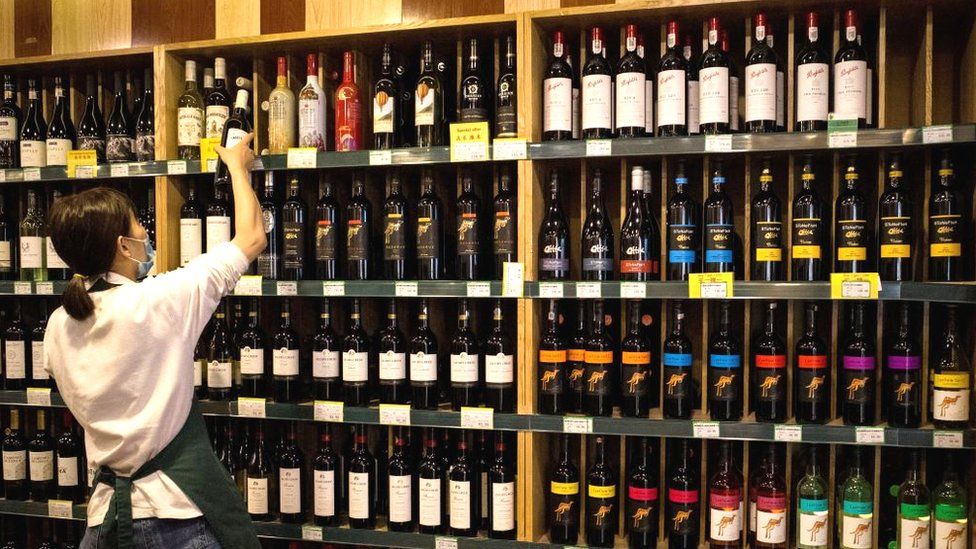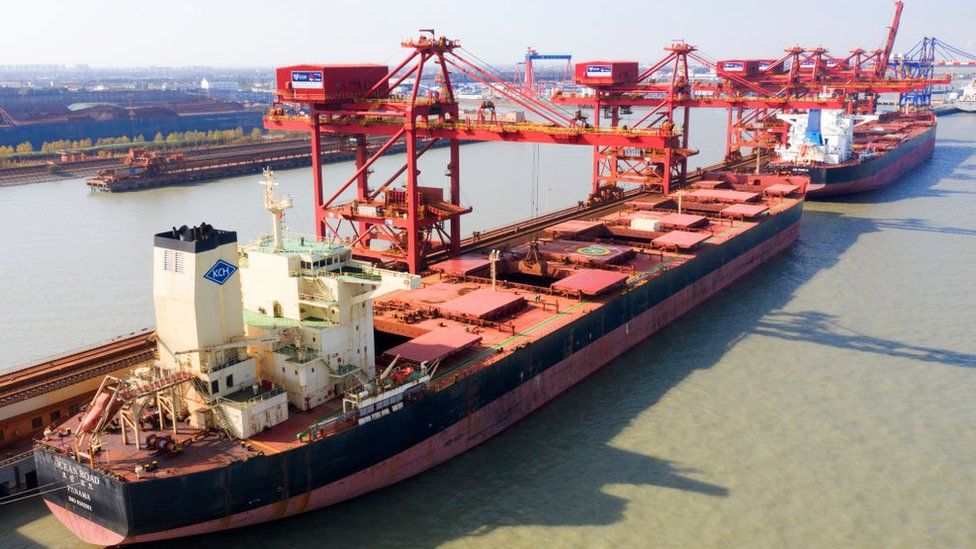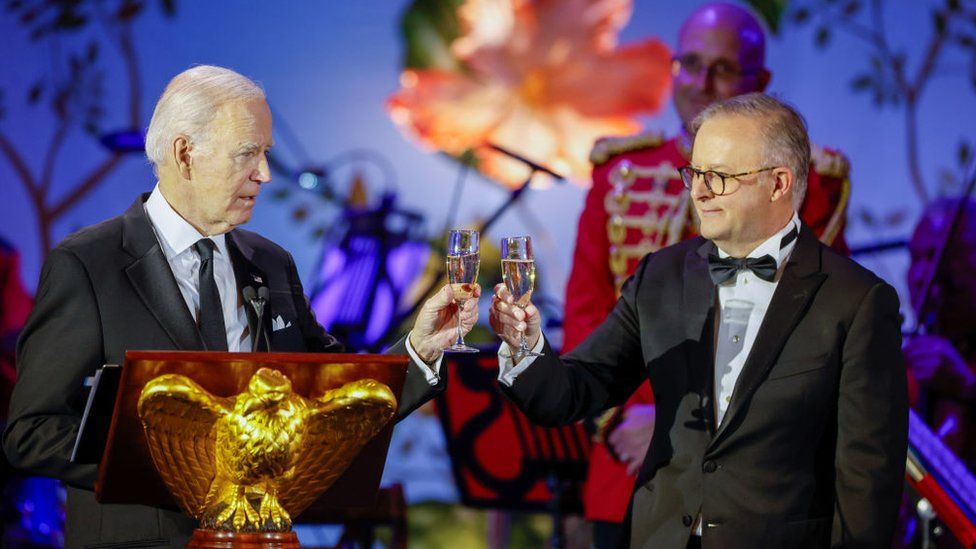China and Australia are proof that governments do not have to like each other to do business.
When Anthony Albanese arrives in China on Saturday, he will be the first Australian prime minister to visit in seven years.
His three-day trip comes in the wake of plummeting relations between the two countries – and Canberra’s growing military ties with Washington.
In recent years Australia and China have accused each other over human rights violations and perceived threats to national security. Public perceptions of the other side are more negative than they have ever been.
But when it comes to trade, they cannot afford to let go of each other. At the peak of their trading relationship in 2020, almost half of Australia’s exports went to China.
By way of comparison, at around the same time roughly 9% of all US exports and only 5% of British exports were being sold to China.
Australia needs China
This kind of leverage can be a powerful tool if a government wants to make a point, which is what happened in 2020 when Australia called for an independent inquiry into the origins of Covid-19.
“That was deeply upsetting to the Chinese government,” said Jane Golley, an economist at the Australian National University (ANU) in Canberra.
“Shortly after, the [Chinese] ambassador here gave a speech and suggested that some Australian industries might suffer as a consequence.”
Sure enough, a string of Chinese tariffs and restrictions followed on an estimated $20bn (£16.4bn) worth of Australian goods. Among the many products affected were barley, beef, wine, coal, timber and lobster.
“Basically the Chinese government was sending a message. They were unhappy with the Australian government and decided to use economic coercion to make that point,” Professor Golley added.

At the time, such a robust move from an important trading partner was a surprise to many. Since then, China has reversed many of the restrictions.
The decision to row back on the tariffs was, at least partly, helped by a change of tack from the newly elected Australian government.
Shortly after meeting with China’s leader Xi Jinping at the G20 summit in Bali last year, Mr Albanese said: “We’re always going to be better off when we have dialogue and are able to talk constructively and respectfully”.
He reminded Australians that trade with China was worth more than with Japan, the US and South Korea combined. Clearly, normalising relations between what he called “two highly complementary economies” would be a priority for his government.
Whether China’s so-called economic coercion was successful is doubtful. Australia is still openly critical of Beijing on several fronts – but there is no question that Australian businesses and workers took a hit because of China’s trade restrictions.
“We can’t live without them, essentially,” Professor Golley said. “I think the Albanese government clearly decided that our economic links were too important to sacrifice and went for an improvement in our diplomacy.”
China needs Australia
Australia has its own levers it can use to its advantage – especially when it comes to natural resources.
“China and Australia are deeply economically interdependent,” said Benjamin Herscovitch, a research fellow at the ANU’s National Security College.
Typically, China has been, and still is, highly reliant on Australia for raw materials to satisfy its vast and growing economy.
Huge amounts of its iron ore and liquefied natural gas, for example, come from Australia. Incidentally, neither of these commodities were subjected to Chinese restrictions.
The Chinese public can live without Australian wine and lobsters, but until the country is able to adequately source materials to make steel or power its factories, Beijing knows it is not in a strong position to start making demands of Australia.

Some analysts argue that China’s trade restrictions were not forcing Canberra closer to Beijing – rather they had the opposite effect.
“The Chinese government started to realise that its coercive economic and diplomatic measures were driving Australia closer to the United States,” said Mr Herscovitch.
“Beijing’s decision to remove trade restrictions and normalise diplomatic contact is aimed at wooing Canberra away from Washington.”
One aim could be to gain Australian support for entry into the Comprehensive and Progressive Agreement for Trans-Pacific Partnership (CPTPP).
This is the successor to the doomed Trans-Pacific Partnership (TPP) – the free trade agreement from which then-US President Donald Trump withdrew. So far several countries, including Australia, have blocked China’s attempts to join.
“To be blunt, China doesn’t have that many friends in the world. We used to be one, but not anymore,” Professor Golley said. “If you think about it, it makes sense to have a strong economic relationship with an ally of the United States. If you’re being cynical, it gives you an opportunity to drive a wedge between us and Washington.”
Having their cake and eating it
Given the heightened tensions with the US, it makes sense that China does not want to alienate America’s allies.
Not only is Washington trying to exclude China from access to technology needed for advanced computer chips and critical minerals needed for green energy, it is also putting pressure on its allies to do the same.
Half of the world’s lithium, for example, is in Australia. Chinese companies want access to such metals that are crucial for making electric vehicles, a field in which China is currently the global leader.

According to Professor Golley, there is a danger that Australia and China become “competitors rather than collaborators” when it comes to issues they need to work together on, such as fighting climate change.
Australia’s close political and military ties with the US mean it will inevitably fall on the American side of the superpower struggle.
But siding with a country whose economic policies actively harm China will only put more strain on the relationship and could risk landing both countries back at square one.
“I don’t know how much longer this can continue”, said Professor Golley. “The Australian government wants a relationship with China in which, basically, we continue to export to them as normal.”
“But at the same time we also diversify away from them and restrict their capital flows into the country. To me, that sounds like we want to have our cake and eat it too.”










26 comments
Hi my family member! I wish to say that this article is amazing, nice written and come with almost all vital infos. I would like to look more posts like this .
This really answered my problem, thank you!
One such software that has been generating buzz these days is the Lottery Defeater
I will immediately grab your rss feed as I can’t find your email subscription link or newsletter service. Do you have any? Please let me know so that I could subscribe. Thanks.
I like this web site very much, Its a really nice office to read and receive info . “There’s nothing I’m afraid of like scared people.” by Robert Frost.
Great site. Plenty of useful information here. I am sending it to some pals ans also sharing in delicious. And of course, thank you on your effort!
Whats up! I just wish to give an enormous thumbs up for the nice info you’ve gotten right here on this post. I shall be coming back to your blog for more soon.
FitSpresso: An Outline FitSpresso is a weight management formula made using five herbal ingredients.
Very great post. I just stumbled upon your blog and wanted to mention that I’ve really loved browsing your blog posts. In any case I will be subscribing to your feed and I’m hoping you write once more soon!
whoah this blog is excellent i love reading your posts. Keep up the great work! You know, many people are hunting around for this info, you could help them greatly.
Very interesting information!Perfect just what I was searching for!
Some truly prize articles on this web site, saved to my bookmarks.
I went over this site and I think you have a lot of superb info , bookmarked (:.
You are a very bright individual!
I do not even know how I ended up here, but I thought this post was good. I don’t know who you are but definitely you are going to a famous blogger if you are not already 😉 Cheers!
Does your website have a contact page? I’m having problems locating it but, I’d like to shoot you an e-mail. I’ve got some ideas for your blog you might be interested in hearing. Either way, great site and I look forward to seeing it develop over time.
I have recently started a web site, the information you offer on this website has helped me tremendously. Thank you for all of your time & work.
You actually make it appear so easy with your presentation however
I to find this matter to be actually one thing which I think I’d never understand.
It sort of feels too complex and very wide for me.
I’m having a look ahead to your subsequent submit, I will try to get
the cling of it! Najlepsze escape roomy
Heya i’m for the first time here. I found this board and I find It really useful & it helped me out much. I am hoping to give something back and help others such as you aided me.
I loved as much as you will receive carried out right here.
The sketch is attractive, your authored subject matter stylish.
nonetheless, you command get got an nervousness over that you wish be delivering the following.
unwell unquestionably come more formerly again since exactly the same nearly
a lot often inside case you shield this hike.
Hello there, just became aware of your blog through Google, and found that it is truly informative. I am gonna watch out for brussels. I will appreciate if you continue this in future. A lot of people will be benefited from your writing. Cheers!
Enjoyed studying this, very good stuff, thankyou.
Hi there! This article couldn’t be written any better! Reading through this post reminds me of my previous roommate! He constantly kept preaching about this. I’ll forward this post to him. Pretty sure he will have a good read. Many thanks for sharing!
This is the right webpage for anyone who hopes to understand this topic. You know a whole lot its almost tough to argue with you (not that I really would want to…HaHa). You definitely put a brand new spin on a topic that has been discussed for a long time. Great stuff, just great.
This web site really has all the information I needed concerning this subject and didn’t know who to ask.
Spot on with this write-up, I seriously believe this web site needs much more attention. I’ll probably be back again to read through more, thanks for the information!